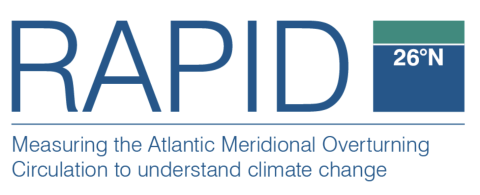Rapid Climate Change (RAPID) 2001-2007
The first phase of RAPID saw the start of the RAPID array across the Atlantic at 26° N along with another 38 research projects to study the AMOC and its links with climate over the past 8-9000 years, using palaeo- and present-day observations and a range of modelling studies. Highlights from this research can be found in the RAPID climate change brochure.
This was a £20 million, six-year (2001-2007) programme of the Natural Environment Research Council. The programme aimed to improve our ability to quantify the probability and magnitude of future rapid change in climate, with a main (but not exclusive) focus on the role of the Atlantic Ocean's Thermohaline Circulation.
Dr Meric Srokosz was the Science Co-ordinator for the programme and Dr Val Byfield was the Deputy Science Co-ordinator, having taken over from Dr Christine Gommenginger from 1 April 2005. In autumn 2005 Dr. Craig Wallace joined the team as Knowledge Transfer co-ordinator. They have established a Rapid Climate Change project office at the National Oceanography Centre, Southampton.
RAPID-WATCH 2008-2014
The second phase (RAPID-WATCH) concentrated on observations of the present-day AMOC and modelling studies to explore mechanisms controlling its flow and improve our understanding of how AMOC variability and change affects climate in Europe and elsewhere. This phase completed the decade-long time series of AMOC data from 26°N and explored how these observations might be used with other observing systems to improve our ability to predict AMOC variations and their impact on climate at seasonal to decadal and longer time scales
RAPID-WATCH built on RAPID to deliver a decade-long (2004-2014) time series of observations of the Atlantic Meridional Overturning Circulation (MOC). The observations was used with data from other sources to
- determine and interpret recent changes in the Atlantic MOC,
- assess the risk of rapid climate change due to changes in the MOC, and
- investigate the potential for predicting the MOC and its impacts on climate.
This work is carried out in collaboration with the Hadley Centre in the UK, and through international partnerships.

Website: www.rapid.ac.uk
Principal Investigator: Ben Moat
Email: ben.moat at noc.ac.uk
NERC – National Capability
NERC – Strategic Research
NERC – Capital
